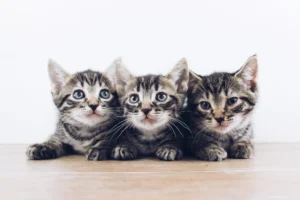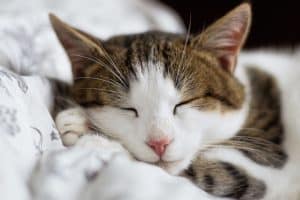Cats have a significantly shorter lifespan compared to humans, leaving many to wonder why this is the case. Understanding the factors that contribute to cats living less than humans can provide insight into the nature of these beloved pets and help us appreciate their time with us even more.
Genetics and Evolution
When it comes to the lifespan of our beloved feline friends, genetics and evolution play a significant role. Cats have a genetic makeup that naturally predisposes them to shorter lives compared to humans. Evolution has shaped cats to be efficient hunters with shorter life spans to ensure the survival of the species. In the wild, a shorter life span allows for faster reproduction and adaptation to changing environments.
Cats have a higher metabolic rate than humans, which means their cells divide at a faster pace, leading to quicker aging. Additionally, compared to humans, cats are more prone to certain genetic diseases and conditions that can affect their longevity. While genetics play a crucial role, it’s essential to consider other factors that impact a cat’s lifespan.
Environment and Lifestyle
The environment and lifestyle in which a cat lives can have a significant impact on their life expectancy. Indoor cats generally have a longer lifespan compared to outdoor cats due to reduced exposure to risks such as accidents, diseases, and predators. Providing a safe and enriching indoor environment can help ensure a cat’s well-being and longevity.
Diet also plays a crucial role in a cat’s lifespan. A balanced and nutritious diet can help prevent obesity and reduce the risk of various health issues that can shorten a cat’s life. Additionally, regular veterinary care, exercise, and mental stimulation are essential for maintaining a cat’s overall health and extending their life expectancy.
It’s important to create a stress-free environment for your cat, as stress can have negative effects on their health and well-being. Providing a comfortable and secure living space, regular playtime, and interaction with their human companions can help reduce stress levels and promote a longer, happier life for your feline friend. Remember, a happy and healthy cat is more likely to live a full and fulfilling life.
Health and Medical Care
Taking care of your feline friend’s health is crucial in extending their lifespan. Regular check-ups with a veterinarian can help catch any potential issues early on. Common health issues in cats include dental problems, obesity, and kidney disease. Providing a balanced diet, plenty of fresh water, and regular exercise can help prevent these issues. Additionally, ensuring your cat is up to date on vaccinations and parasite prevention is essential for their overall well-being. If any health concerns arise, don’t hesitate to seek veterinary treatment promptly to address them and provide the best possible care for your cat.
Aging Process
Cats age differently than humans, which affects their lifespan. While humans typically live around 70-80 years, cats have a much shorter average lifespan of 12-18 years. Understanding the aging process in cats is essential for providing proper care as they get older. Cats are considered seniors around 10-12 years old, and they may experience age-related conditions such as arthritis, dental issues, and decreased mobility. Providing a comfortable environment, a senior-friendly diet, and regular veterinary check-ups can help manage these changes and ensure your cat’s golden years are happy and healthy.
Additional Insight:
– As cats age, their nutritional needs may change. Consider switching to a senior cat food formula that is specifically designed to support your aging cat’s health and well-being. Consult with your veterinarian to determine the best diet for your senior feline friend.
Breed Variations
Different cat breeds have varying lifespans due to a variety of factors. Smaller breeds such as Siamese cats tend to live longer, with an average lifespan of 15-20 years, while larger breeds like Maine Coons may only live 10-15 years. Genetic predispositions can also play a significant role in how long a cat lives, with certain breeds being more prone to specific health issues that can shorten their lifespan. For example, Persian cats are susceptible to respiratory problems due to their flat faces. Mixed-breed cats, on the other hand, often have longer lifespans as they benefit from a more diverse genetic pool. Providing regular vet check-ups, a balanced diet, and keeping your cat indoors can all contribute to helping them live a longer and healthier life.
Quality of Life
Ensuring a high quality of life for your feline friend can greatly impact their lifespan and overall well-being. Proper nutrition is crucial, so opt for high-quality cat food that meets their dietary needs. Regular exercise is also important to keep your cat at a healthy weight and prevent obesity-related health issues. Stress and anxiety can negatively affect a cat’s health, so provide a safe and comfortable environment for them to thrive in. Spaying or neutering your cat can also increase their lifespan by reducing the risk of certain cancers and infections. Additionally, regular grooming, dental care, and mental stimulation through play and interaction can all contribute to a longer, happier life for your furry companion.
- Annual Veterinary Visits: Regular check-ups with a veterinarian can help catch any health issues early and ensure your cat receives timely treatment.
- Environmental Enrichment: Providing toys, scratching posts, and perches can keep your cat mentally stimulated and prevent boredom-related behavior issues.
- Hydration: Ensure your cat has access to fresh water at all times to promote kidney health and overall well-being.
- Sunlight Exposure: Allowing your cat access to natural sunlight can help regulate their sleep-wake cycle and provide essential vitamins.
- Pet Insurance: Consider investing in pet insurance to help cover the cost of unexpected vet bills and ensure your cat receives the care they need.
By understanding the factors that influence a cat’s lifespan and taking proactive steps to provide a high quality of life, you can help ensure your feline companion enjoys a long and healthy life by your side.
Human-Animal Bond
The bond between humans and their feline companions is incredibly special. Cats often become cherished members of our families, providing comfort, companionship, and endless entertainment. Despite their shorter lifespan compared to humans, the love and joy they bring into our lives are immeasurable. Cats live less than humans due to a combination of genetic factors, size differences, and metabolism rates. While it’s heartbreaking to say goodbye to a beloved cat, it’s essential to remember the beautiful moments shared and the unconditional love they gave us.
Coping with Loss
Losing a beloved cat can bring immense grief, but it’s crucial to allow yourself to feel and process those emotions. Cherish the memories created with your feline friend, and consider creating a special memorial to honor their life. Seek support from friends, family, or even online pet loss support groups, as talking about your feelings can help in the healing process. Remember, it’s okay to grieve and take all the time you need to mourn the loss.
Ways to Cope with Loss:
- Create a memorial: Dedicate a special space in your home or garden to remember your cat.
- Celebrate their life: Host a small gathering or ceremony to honor your cat’s memory.
- Write a letter: Express your feelings and memories in a heartfelt letter to your cat.
- Support groups: Join online communities or attend pet loss support groups to connect with others experiencing similar grief.
- Practice self-care: Take care of yourself during this difficult time by engaging in activities that bring you comfort and peace.
Fun Facts About Cats
Did you know that cats have a unique sleeping pattern that consists of short naps throughout the day? Unlike humans who typically sleep for long periods at once, cats are naturally programmed to have multiple cat naps, allowing them to conserve energy and be ready for quick bursts of activity.
Cats also have a special grooming behavior known as “allogrooming,” where they groom each other as a form of social bonding. This behavior helps strengthen relationships within a colony of cats and contributes to their overall well-being.
Another fascinating fact about cats is their exceptional agility and balance. Cats are known for their ability to land on their feet when they fall, thanks to a flexible spine and a keen sense of balance. This unique skill is a testament to their remarkable acrobatic abilities.
Cat Care Tips
When it comes to ensuring your cat lives a long and healthy life, proper nutrition is key. Make sure to feed your cat a balanced diet that meets their specific dietary needs, whether it’s dry or wet food. Consult with your veterinarian to determine the best food options for your feline friend.
Regular exercise is also essential for maintaining your cat’s health and well-being. Provide opportunities for play and physical activity to keep your cat active and mentally stimulated. Interactive toys, scratching posts, and climbing structures are great ways to encourage your cat to stay active.
In addition to nutrition and exercise, regular veterinary check-ups are crucial for early detection of any potential health issues. Schedule annual wellness exams to ensure your cat is up-to-date on vaccinations and to address any health concerns promptly.
Cat Care Tips
- Regular Vet Visits: Schedule annual wellness exams to keep your cat healthy and address any concerns early on.
- Proper Nutrition: Feed your cat a balanced diet that meets their specific dietary needs for optimal health.
- Interactive Play: Provide toys and activities to keep your cat active and mentally stimulated.
Remember, by providing your cat with the proper care, attention, and love, you can help ensure they live a long, happy, and fulfilling life.
Alex, a passionate animal lover, has experience in training and understanding animal behavior. As a proud pet parent to two dogs and three cats, he founded AnimalReport.net to share insights from animal experts and expand his knowledge of the animal kingdom.









